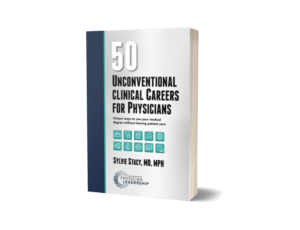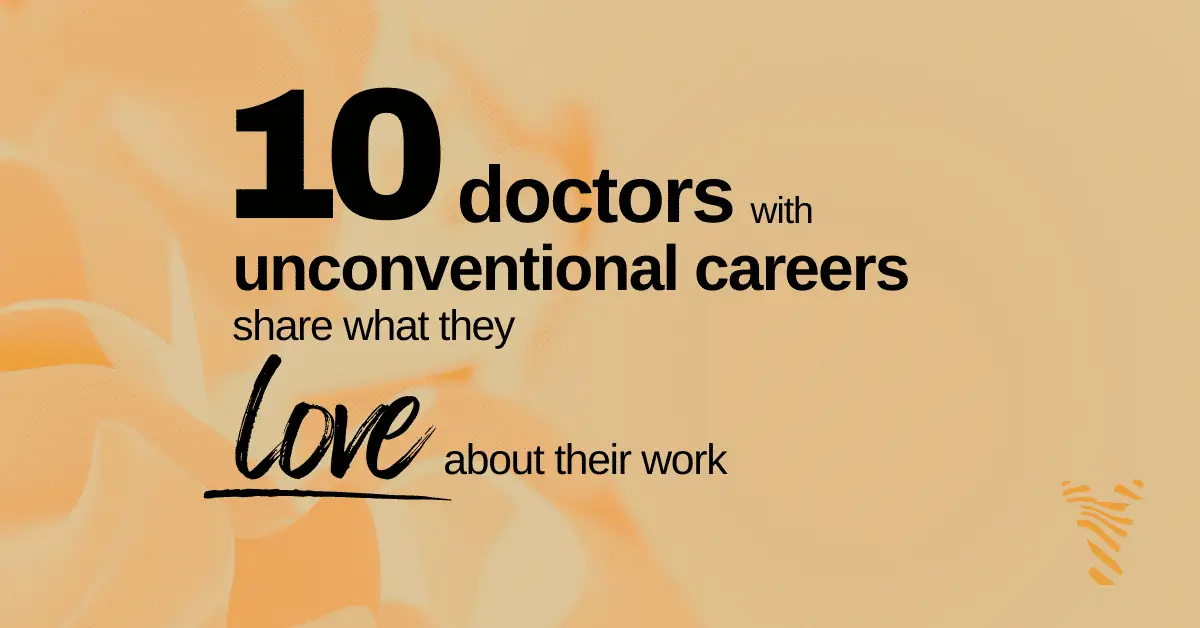Published by Lookforzebras
This guest post is written by Sylvie Stacy, MD, MPH.
For my new book 50 Unconventional Clinical Careers for Physicians, I interviewed 10 physicians with a variety of backgrounds, specialties, work settings, clinical concentrations, and practice types. They all have jobs and professional journeys that are somehow out of the ordinary or off the beaten path. None of them is employed full-time at a hospital. None of them is an employee or partner in a standard outpatient practice focusing on primary care or a core medical specialty.
Despite their less conventional work, they all still actively practice medicine. Their work touches the lives of patients in a direct manner, whether by seeing and treating patients in person, doing telemedicine, conducting chart reviews, or supervising other medical practitioners. They all are using the skills they learned and honed in medical school and residency. They all have expertise in their fields.
A notable thing about many physicians with unconventional career paths is that they are professionally satisfied. They are less likely to be frustrated with the practice medicine and less likely to be burned out. The 10 physicians that I interviewed for my book are prime examples of this. Here are some highlights from each of them on the topic of what they like best about their jobs and career paths.
Best parts of being an occ doc
Specialty and clinical concentration: Occupational medicine; Workers’ Compensation
Practice setting and employment structure: Employed by a national nonprofit with healthcare facilities across the US and works in an outpatient occupational medicine clinic
What do you enjoy most about your work?
I work Monday through Friday 9 to 5. No nights, no weekends, and no call. My time away from the office is my own time.
When workers are hurt on the job, often their only means of medical care, as well as financial benefits when they are unable to work, come solely from our medical department and the Workers’ Compensation carrier. If it were not for Workers’ Compensation care for these patients, it is possible they would live the rest of their lives with a permanent disability and not be able to return to work.
Best parts of owning and directing a ketamine clinic
Specialty and clinical concentration: Ketamine specialist; Emergency medicine background
Practice setting and employment structure: CEO and Medical Director of a ketamine clinic
What do you enjoy most about your work?
Working with IV ketamine is on the cutting edge of medicine and it seems like a lot of physicians are not aware of the evidence supporting its use.
I enjoy how rapidly IV ketamine therapy can work for some patients who have “tried everything else” before. It’s emotionally and spiritually nourishing to know that I’ve made a difference in someone’s life. I also believe in the “butterfly effect” and know that as our patients’ lives are improved, they will further impact those around them as well.
I love the autonomy of having my own clinic and not answering to an administrator telling me how to practice medicine.
Best parts of being a locums surgeon
Specialty and clinical concentration: Cardiothoracic surgeon
Practice setting and employment structure: Locum tenens assignments throughout the country
What do you enjoy most about your work?
I can work part-time and still function like a full-time surgeon and still have a quality of life. I can work only two weeks a month, yet I still get to operate and take care of patients. Most years I take 12 to 14 weeks off.
I love going to hospitals that really need help and being able to provide good surgery to patients in need. I love that I can still operate on patients, but do it on my terms.
The advantage of my locums payment structure is that if I work a very long day, I get paid extra. If I get stuck waiting two hours for a case to start, I am getting paid. If I have an emergency case that goes all night, I get paid for every minute that I am in the hospital.
Best parts of working in addiction treatment centers
Specialty and clinical concentration: Addiction medicine; OB/GYN background
Practice setting and employment structure: Part-time in an Opioid Treatment Program and an outpatient addiction treatment center
What do you enjoy most about your work?
I enjoy working with patients that are truly turning their lives around. Stories such as the individual who has overcome their prior inability to repair their car or keep a job are quite rewarding. Seeing patients improve, function fully, and lead productive lives is fulfilling.
I do miss my surgical and obstetric career, but find patient care in this season of my career is still worthwhile, and in its own way. I work directly with most of the pregnant patients in these clinics as well, and that allows me to combine my prior specialty with my newer field. I chose to get a second board certification in addiction medicine to provide the level of excellence I’ve always striven for, and the level of expertise I want to offer.
Best parts of IME consulting
Specialty and clinical concentration: Independent Medical Exams (IMEs) for long- and short-term disability, Social Security disability, Veterans’ disability, standardized testing accommodations, and more
Practice setting and employment structure: Independent contractor for organizations spanning from local independent entities to government municipalities to multinational Fortune 500 companies
What do you enjoy most about your work?
Each client has different expectations of me. But, unless I am performing an in-person IME, my IME work essentially allows me to work when I want and where I want.
I enjoy the freedom of my work, which essentially allows me to set my own schedule. The work is often mentally stimulating and I am exposed to all branches of medicine.
My take home pay is also higher than what I would earn practicing clinical medicine.
Best parts of being a correctional healthcare leader
Specialty and clinical concentration: Correctional medicine; Family medicine background
Practice setting and employment structure: Chief Medical Officer for a privately-owned company that provides health care services to jails and prisons across the country
What do you enjoy most about your work?
The correctional patient population is the most underserved group I have worked with. It is a very fulfilling job knowing you are making a difference in a patient’s life when they are likely at one of the lowest points in their life and see very little hope in their situation. Helping them at this critical point can have a huge impact.
I feel we have a responsibility to our profession to develop the next generation of health staff. The correctional environment can be an excellent training ground for new nurses, mental health staff, and medical and psychiatric providers.
Best parts of lifestyle and functional medicine
Specialty and clinical concentration: Lifestyle medicine and functional medicine
Practice setting and employment structure: Owner of a wellness center offering lifestyle and functional medicine
What do you enjoy most about your work?
I enjoy that I get to work with wonderful people, the amazing transformations of my patients, and the impact my team is making.
Nowadays, over 50% of physicians are employed and a much higher majority accept health insurance. In my case, I co-own my wellness center and don’t accept insurance.
Besides the clinical work, I enjoy teaching other physicians about entrepreneurship. I help like-minded doctors choose a better life for themselves by teaching and speaking.
Best parts of practicing part-time
Specialty and clinical concentration: Student health; Wound care specialist; Emergency medicine background
Practice setting and employment structure: Part-time at a university student health center and part-time providing wound care services in nursing homes
What do you enjoy most about your work?
After nearly a decade of rotating through morning, evening and overnight shifts as well as covering every other weekend and holidays as an emergency physician, I felt I needed a change. The transition to college health allowed me to be a more present mother while providing medical care to a dynamic and fascinating patient population.
My schedule is structured around the university’s academic calendar. I do not work over winter or summer breaks. This was particularly appealing to me while I was raising 3 children. Once my children went off to college, I chose to add a second part time job as a wound care specialist in nursing homes. Two part time jobs allows greater flexibility for my schedule (as opposed to one full time position), while supplementing my income and broadening my scope of practice.
I find the college students to be well-informed, engaging and appreciative patients, who are often taking charge of their health care for the first time in their lives.
Best parts of being a federal employee
Specialty and clinical concentration: Foreign Service Medical Specialist; Primary care background
Practice setting and employment structure: Regional Medical Officer with the United States Department of State, Bureau of Medical Services
What do you enjoy most about your work?
My work is about being a diplomat – building bridges with medical providers in nations around the world so that my patients get the care they need. Along the way, I learn incredible new things about different cultures and medical systems and support the crucial work Americans do abroad.
I never get bored. I get to move to a new place/work assignment/country every 1 to 3 years so I am also challenged in new ways, which keeps it exciting. Also, I reach retirement eligibility with a pension after 20 years of service.
Best parts of telemed practice ownership
Specialty and clinical concentration: Sleep medicine; Pulmonary medicine; Critical care medicine
Practice setting and employment structure: Founder and CEO of telemedicine company specializing in telepulmonology, tele-ICU, and tele-sleep services
What do you enjoy most about your work?
The thing I enjoy most about my work is the ability to make a difference in a patient’s life and the ability to direct my energy towards a meaningful goal.
When patients appreciate the care that they receive or when they write poems, send thank you cards and positive feedback sharing their experience, it makes this uphill endeavor of practice ownership worth the sweat.
I learn daily and try to incorporate that learning into my daily business activities to make sure that my company not only survives but thrives. I get to explore ways to innovate, and collaborate with others in the same space.
Learn more about unconventional careers for physicians
There are so many ways that a physician’s career can be unconventional. This article covered just a handful of examples of how doctors can carve out unique, fulfilling career paths outside of traditional medical practice.
The shared theme among these examples is a sense of fulfillment and the ability to impact lives in meaningful ways, all while maintaining work-life balance and professional autonomy.
My book 50 Unconventional Clinical Careers for Physicians delves deeper into these stories and many more. It is written for any physician, medical student, or trainee seeking satisfying work in medicine or looking to pivot their career.

Consider this an invitation to explore the many possibilities that a medical degree gives you!

